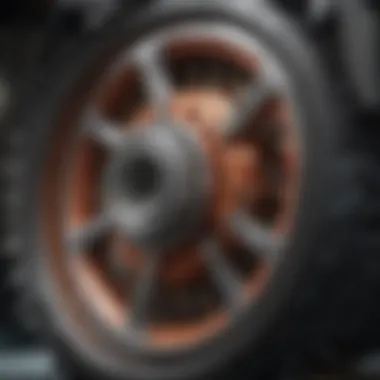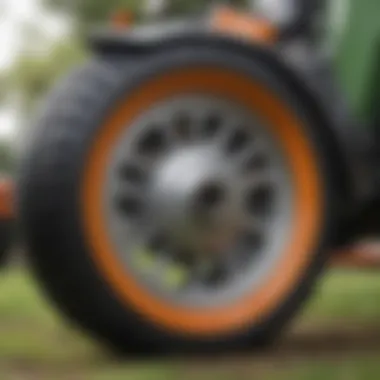Wheel Motors for Zero Turn Mowers: An In-Depth Analysis


Intro
The use of wheel motors in zero-turn mowers is a highly relevant topic for those involved in agriculture and horticulture. These devices significantly enhance lawn care by providing precise maneuverability and improved efficiency. Understanding wheel motors not only offers insight into their technical aspects but also reveals how they contribute to overall performance in various applications.
This article presents a detailed analysis of the mechanics behind wheel motors, their advantages, and considerations for performance and durability. By exploring the current trends in technology and best practices, the discussion becomes particularly pertinent for farmers and horticulture enthusiasts looking to implement efficient solutions in their day-to-day activities.
Current Trends in Agriculture and Horticulture
Overview of Recent Innovations
The agricultural sector is continually evolving with innovative technologies aimed at improving productivity and sustainability. One prominent innovation is the adoption of wheel motors in zero-turn mowers. These motors allow for smoother operation and greater speed control, essential for maintaining large lawns or nursery spaces.
- Electric wheel motors are gaining traction due to environmental concerns.
- Sensor technologies are incorporated for precise control, optimizing mowing patterns.
As more farmers and garden enthusiasts recognize the benefits of these innovations, manufacturers are likely to invest in research and development, leveraging advancements in wheel motor technology.
Sustainable Practices Gaining Popularity
Sustainability is becoming a key concern in agriculture, leading to a demand for technologies that minimize environmental impact. Zero-turn mowers equipped with efficient wheel motors are designed not only for performance but also for sustainable operation. They utilize less fuel compared to traditional mowers and have lower emissions, making them a preferred choice for environmentally conscious users.
- Using wheel motors can reduce mowers' overall carbon footprint.
- The ability to mow in tighter spaces reduces the need for additional equipment, further optimizing resource use.
Harvesting these benefits aligns with the shift towards greener practices, helping farmers and landscapers to contribute positively to the environment.
Essential Farming Techniques
Soil Health Management
Healthy soil is the foundation of productive agriculture. Practices such as crop rotation, cover cropping, and the responsible use of wheel motors for turf maintenance can enhance soil structure and nutrient content. Zero-turn mowers make it easier to manage these areas without compacting the soil, preserving its health.
Pest and Disease Control Strategies
Effective pest control remains crucial for crop yields. Zero-turn mowers fitted with advanced wheel motors can facilitate targeted spraying operations. This approach minimizes chemical use while maximizing effectiveness, demonstrating a progressive technique in pest management.
Tools and Technology in Farming
Overview of Advanced Farming Tools
The integration of technology in farming practices has led to the development of several advanced tools. Wheel motors are an integral part of this shift, reducing the impact of traditional machinery on fields. Through improved design and mechanics, they enhance mowing efficiency and versatility.
Case Studies on the Use of Technology
Examining real-life applications of wheel motors reveals their significance. For instance, landscapers have reported higher productivity when using zero-turn mowers equipped with these motors in complex spaces typical of urban environments. This adaptability enhances user efficiency, thereby proving their value in varying contexts.
"The implementation of wheel motors translates into improved agility and performance, leading to a marked increase in user satisfaction and operational effectiveness."
Integrating technological advancements within agricultural practices, particularly through the use of wheel motors in zero-turn mowers, paves the way for more productive, sustainable, and forward-thinking approaches to landscape management. This merits further exploration as the industry continues to evolve.
Preamble to Wheel Motors
In the context of zero-turn mowers, wheel motors play a vital role in enhancing efficiency and maneuverability. Understanding their function and importance is key for anyone involved in lawn care, whether at a professional or personal level. Wheel motors are not merely components of garden equipment; they are central to its performance and usability. Without a solid grasp of how wheel motors operate and the benefits they offer, users may underestimate the capabilities of their mowers.
Definition and Functionality
Wheel motors are devices that convert electrical or hydraulic energy into mechanical energy. This conversion powers the movement of the wheels on zero-turn mowers. They operate on straightforward principles: energy from a power source is transferred into motion that drives the mower.
- Electric Motors: Use electrical energy to generate motion, enabling quiet and emission-free operation.
- Hydraulic Motors: Utilize hydraulic fluid to create rotational motion. They offer high torque, making them suitable for demanding tasks.
- Pneumatic Motors: Rely on air pressure to drive mechanical motion, though less common in mowers.
The design of wheel motors varies, but they largely comprise a motor housing, a shaft, and gearing mechanisms. The integration of these components influences how efficiently and effectively the mower operates, impacting everything from speed to handling.
Importance in Zero Turn Mowers


The importance of wheel motors in zero-turn mowers cannot be overstated. They enhance maneuverability, allowing the mower to pivot on a dime. This feature is particularly beneficial for landscaping tasks that require precise navigation around flower beds, trees, and other obstacles.
Some notable benefits include:
- Increased Efficiency: The performance of wheel motors can lead to shorter mowing times.
- Versatile Applications: Their capability allows for varied use, from residential yards to commercial properties.
- User Control: Enhanced control translates to a smoother mowing experience, benefitting both amateurs and professionals.
As the landscape industry evolves, optimal performance increasingly depends on these motors. Understanding their role can help users maximize the potential of their zero-turn mowers and provide valuable insights for making informed purchasing decisions.
Mechanics Behind Wheel Motors
Understanding the mechanics behind wheel motors is crucial for grasping how zero turn mowers achieve their remarkable maneuverability and efficiency. Wheel motors are designed to convert hydraulic or electrical energy into mechanical energy, enabling precise control of each wheel independently. This specific ability is what allows zero turn mowers to perform tight turns and navigate complex landscapes seamlessly.
Several factors contribute to the effectiveness of wheel motors in this application, including the types of motor technologies used, the individual components of the motors themselves, and the overall design.
Basic Principles of Operation
Wheel motors function by converting energy into torque, which is then transmitted to the wheels. The basic principle involves the rotation of the motor shaft which drives the wheels directly. In hydraulic systems, pressurized fluid from a pump forces pistons within the motor to turn the shaft. Conversely, electric motors rely on electromagnetic forces to create rotation. Essentially, the efficiency of these motors depends on factors such as the type of energy utilized, the design of the components, and the control systems in place.
Types of Wheel Motors
Hydraulic Motors
Hydraulic motors are common in zero turn mowers due to their high power density and ability to provide substantial torque. One of the key characteristics of hydraulic motors is their capability to operate under high pressures. This means they can deliver significant power even in compact designs. The unique feature of hydraulic motors is their responsiveness; they can instantly adjust torque output based on the operator’s control inputs.
However, hydraulic motors also have some disadvantages. They require a hydraulic fluid that needs to be maintained, and there can be leakage issues which may affect efficiency. Despite these challenges, their robust performance makes them a popular choice in lawn care equipment.
Electric Motors
Electric motors are gaining popularity in zero turn mowers, primarily due to their low maintenance requirements and high efficiency. A key characteristic of electric motors is their quiet operation, making them suitable for residential areas where noise might be a concern.
The unique feature of electric motors is then the use of batteries or direct electric connections, which offer sustainability options. However, their power output can vary depending on battery capacity and discharge rates, which can limit performance in some scenarios.
Pneumatic Motors
Pneumatic motors use compressed air to produce motion. They are not as common in zero turn mowers but have some advantages in certain settings. A significant aspect of pneumatic motors is their lightweight design, which can help reduce the overall weight of the mower. They are also capable of operating in wet conditions without risk of damage, unlike their electric or hydraulic counterparts.
Nonetheless, pneumatic motors often lack the torque required for heavy-duty mowing tasks, which can be a limitation in performance. They are suitable for lighter duties and niche applications but are not the primary choice for standard zero turn mowers.
Components of Wheel Motors
Motor Housing
The motor housing plays a significant role in protecting internal components from external elements such as dirt or moisture. It is designed to withstand various weather conditions, enhancing the durability of the mower. A key characteristic of the housing is its sturdy design, which is essential for long-term use.
While robust, the housing must also allow for heat dissipation since motor operation generates internal heat. Poor heat management can lead to performance degradation and motor failure.
Shaft
The shaft is crucial in transmitting power from the motor to the wheels. A solid shaft design can endure high torsional loads, which is paramount for preventing failures during operation. The unique feature of the shaft is its precise engineering, enabling smooth rotations at varying speeds.
However, shafts can experience wear over time, especially if they are not adequately maintained. Regular inspections are necessary to address potential issues before they lead to significant failures.
Gears and Gearbox
Gears and gearbox systems enhance the torque delivered to the wheels. This component is vital for ensuring that the mower operates effectively at different speeds and workloads. The key characteristic here is the gear ratio, which affects how speed and torque are distributed.
The uniqueness of using gears lies in their ability to adapt to various mowing conditions. However, gearboxes can add weight to the mower and may require periodic maintenance to ensure longevity and performance.
Advantages of Wheel Motors in Zero Turn Mowers
The significance of wheel motors in zero-turn mowers cannot be overstated. These motors serve as the backbone of the mower’s operation, contributing not only to its movement but also to its overall efficiency. Understanding the advantages of wheel motors is crucial for enthusiasts and professionals alike who seek to enhance their lawn care practices.


Enhanced Maneuverability
One of the most prominent benefits of wheel motors in zero-turn mowers is their exceptional maneuverability. This capability arises from the independent control of the wheels, allowing for tight turns and agile movements in small spaces. Users can easily navigate around obstacles, making these mowers ideal for landscaping projects that demand precision. The capacity to pivot around a point gives an advantage in complex terrains.
Improved Efficiency and Performance
Efficiency is another key advantage. Wheel motors optimize power delivery right to the wheels, leading to improved performance. This results in more effective cutting speeds and lower fuel consumption. As they provide consistent torque, the load on the engine is minimized, which allows for extended periods of operation without frequent refueling. Additionally, the precision in movement contributes to an evenly manicured lawn, reducing the need for multiple passes over the same area.
Reduced Maintenance Costs
Maintenance is a critical concern for any equipment owner. Wheel motors require less maintenance compared to traditional transmission systems. With fewer moving parts, the risk of mechanical failure is diminished. This translates into lower maintenance costs and less downtime. Regular care generally involves basic inspections and less routine servicing, which is a significant benefit for farmers and landscapers operating on tight schedules.
"The integration of wheel motors not only extends equipment life but also enhances user experience through simpler maintenance requirements."
Performance Factors of Wheel Motors
Understanding the performance factors of wheel motors is essential in comprehending how these components enhance the efficiency of zero-turn mowers. This section elaborates on critical elements, focusing on power output, torque, speed, responsiveness, and environmental conditions. Each factor influences how effectively these mowers can operate, ultimately benefitting users who strive for precision in lawn care.
Power Output and Torque
Power output refers to the amount of work a motor can perform over a specific period. It directly affects how efficiently a zero-turn mower can cut through dense grass or tackle uneven terrain. Torque, on the other hand, is the rotational force produced by the motor. The balance between power output and torque is crucial for optimal performance. When evaluating wheel motors, it’s important to consider:
- High Torque Ratings: These assist in initiating motion and handling challenging terrains.
- Consistent Power Delivery: Maintaining power across different loads ensures the mower operates effectively, even in tough scenarios.
Engineers focus on achieving a sweet spot in power and torque to ensure mowers perform under varied conditions.
Speed and Responsiveness
Speed and responsiveness are closely linked factors that dictate how quickly and accurately a mower can navigate the landscape. Speed in wheel motors affects the cutting rate and overall efficiency of operation. Responsiveness allows for precise control, enabling the user to turn sharply or move in tight spaces. Key considerations include:
- Maximum Speed: The ability to cover large areas quickly without compromising cutting quality.
- Acceleration and Deceleration: Swift transitions between speeds can enhance user experience and operational safety.
A mower that responds quickly to user commands allows for improved maneuverability, which is a crucial factor in achieving a well-groomed lawn.
Environmental Considerations
The environmental impact of wheel motors comes into play when considering sustainability and compliance with regulations. In today’s market, it is essential for manufacturers to develop motors that not only perform well but also align with eco-friendly initiatives. Factors to keep in mind are:
- Energy Efficiency: Motors that consume less power contribute to lower operational costs and reduced environmental impact.
- Emission Standards: Compliance with emissions regulations is crucial for both electric and conventional motors.
By prioritizing environmentally friendly technologies, the industry can support sustainable practices while still focusing on performance.
"Performance is not merely a factor of speed and power, but also includes understanding the environment where the machine operates."
Overall, the performance factors of wheel motors are fundamental in determining the overall capability of zero-turn mowers. Understanding these aspects helps buyers make informed decisions based on their specific needs, leading to effective and sustainable lawn care solutions.
Applications of Wheel Motors
Wheel motors have revolutionized the landscaping and agricultural sectors, particularly in the realm of zero-turn mowers. Their application is a key area of focus in this article, as these motors significantly enhance operational efficiency and performance. From residential lawn care to commercial landscaping and even agricultural use, the role of wheel motors extends beyond mere propulsion; they enable precise control and maneuverability. Understanding these applications is crucial for anyone interested in maximizing the capabilities of their mowing equipment.
Residential Lawn Care
In residential settings, wheel motors contribute to the ease of lawn maintenance. Homeowners with large yards often face challenges in maneuvering traditional mowers around obstacles such as trees, flower beds, and fences. Wheel motors allow for agile turns and tight navigation, making it simpler to achieve a neat and manicured lawn. They enable zero-turn mowers to pivot around a point, which saves time and reduces the effort needed to complete mowing tasks. The efficiency gained in this application translates to better overall care for lawns, as homeowners can now cover more ground in less time.
Commercial Landscaping
Commercial landscaping demands a high level of efficiency and precision due to the scale of operations involved. Wheel motors play a pivotal role in meeting these standards. With their capacity for sharp turns and rapid directional changes, mowers equipped with wheel motors can seamlessly navigate complex landscapes. This advantage is especially valuable in parks, golf courses, and large commercial properties, where aesthetics are paramount. Additionally, the improved efficiency of wheel motors leads to reduced fuel consumption and labor costs, making them a financially smart choice for landscaping businesses.
Agricultural Use
The agriculture sector is yet another area where wheel motors shine. In farming, efficiency directly impacts productivity. Therefore, the ability of wheel motors to operate in various terrains and conditions becomes crucial. They allow farmers to maneuver through tight spaces in orchards or vineyards without damaging crops. Furthermore, the reduced soil compaction ensures better health for the land. As farming practices evolve towards more sustainable methods, the integration of wheel motors into agricultural machinery stands out as a forward-thinking solution to enhance productivity while caring for the environment.


Wheel motors have become essential tools in adapting to the challenges faced in various applications, from residential care to extensive agricultural operations.
Maintenance of Wheel Motors
Maintaining wheel motors in zero-turn mowers is crucial for ensuring longevity and optimal performance. Proper maintenance can prevent costly repairs, enhance efficiency, and ultimately extend the life of the equipment. Given the demanding environments these machines operate in, regular care is not just a suggestion; it is a necessity.
A well-maintained wheel motor contributes significantly to the overall functionality of a zero-turn mower. By focusing on routine inspections, troubleshooting common issues, and understanding the basics of replacement and repair, owners can better manage their equipment and avoid operational downtimes.
Challenges in Wheel Motor Technology
The integration of wheel motors in zero-turn mowers offers various benefits, but it also presents considerable challenges. Understanding these obstacles is essential for both manufacturers and end-users. Delving into the limitations and cost implications of current wheel motor technology allows a more informed decision-making process. This section explores these elements in detail, focusing on how they affect performance, maintenance, and overall effectiveness.
Limitations of Current Technologies
Wheel motor technology, while advanced, is not without its constraints. One significant limitation is the adaptability of these motors to different terrains. Traditional wheel motors may struggle in extreme conditions, such as uneven landscapes or wet surfaces. This inconsistency in performance can lead to inefficiencies, which may frustrate users who expect reliable results.
Other limitations involve the integration of smart technology and automation. Although some wheel motors are equipped with sensors and control systems, many models lack the advanced features necessary for improved adaptability and user experience. This limitation can hinder the effectiveness of precision lawn care.
Lastly, the weight and size of certain motors can also impact maneuverability. A heavier motor can reduce the speed and agility of a zero-turn mower, leading to a less desirable mowing experience.
Cost Implications
The cost of wheel motors is another critical consideration. While the initial investment can be substantial, it is important to assess long-term savings against ongoing expenses. High-quality wheel motors typically yield better performance but come at a premium price.
Manufacturers face pressure to keep costs down, leading to potential compromises in material quality or technology integration. This can result in less durable components, thus increasing the need for repairs and replacements down the line.
Another factor is the cost of maintenance. Advanced wheel motors require specialized knowledge for servicing. As a result, users may find themselves facing higher labor costs or struggling to find qualified technicians. This can deter users from making the switch to more efficient technologies, ultimately limiting market growth.
The challenge with wheel motor technology lies not just in production but also in service and user adaptation.
Future Trends in Wheel Motors
The future of wheel motors in zero-turn mowers is becoming increasingly significant as technology evolves. This section explores the potential advancements and considerations that can shape upcoming innovations. Understanding these trends helps farmers and horticulture enthusiasts stay ahead in adopting new technologies that can enhance operational efficency and sustainability.
Emerging Technologies
Emerging technologies in wheel motor systems are primarily focused on increasing efficiency and performance. One noteworthy development is the integration of brushless DC motors. These motors provide better energy efficiency and have a longer lifespan compared to traditional brushed motors. The shift towards electric drivetrains in zero-turn mowers allows for lower maintenance costs and reduced noise pollution.
Additionally, advancements in sensor technology enhance the performance of wheel motors. Sensors can provide real-time data on wheel speed, torque, and electrical consumption. This data can be used to optimize mowing patterns and energy usage, contributing to better performance overall. Another aspect of these emerging technologies involves automation. Automated wheel motors can adjust their power based on the terrain or grass thickness, ensuring an optimal mowing experience without manual calibration.
Sustainability Initiatives
Sustainability initiatives in the development of wheel motors are essential in today's ecological climate. As environmental regulations tighten and consumer awareness grows, manufacturers are under pressure to adopt greener practices. One key initiative is the use of recyclable materials in the production of wheel motors. Manufacturers are increasingly looking at sourcing components that are not only efficient but also reduce landfill waste.
Another important trend is the push for more energy-efficient designs. By focusing on lower energy consumption levels and higher energy recovery systems, wheel motors can contribute to reducing the carbon footprint of lawn care. In addition, electric wheel motors support the trend toward electric zero-turn mowers, which generate no direct emissions compared to gas-powered alternatives.
As the agricultural sector transitions towards sustainability, it is crucial for technology to align with these environmental goals.
Moreover, companies are exploring energy storage solutions, such as batteries made from sustainable materials. These batteries can power wheel motors without relying solely on fossil fuels, further minimizing environmental impact.
In summary, the future trends in wheel motors for zero-turn mowers represent a convergence of technological advancements and sustainability initiatives. With the ongoing development of efficient technologies and a commitment to reducing environmental impact, the wheel motors of tomorrow promise to offer significant benefits to farmers and landscape professionals alike.
End
The role of wheel motor technology in zero-turn mowers cannot be understated. This article has extensively documented the mechanics, advantages, applications, and future trends of this technology. Understanding these components is crucial for anyone involved in lawn care, horticulture, or landscaping.
A proper comprehension of wheel motors translates to enhanced performance, efficiency, and cost-effectiveness. By integrating advanced motor technologies, users gain improved maneuverability and control over their mowers. Moreover, knowledge of maintenance practices can ensure longevity and operational efficiency.
In addition, recognizing the challenges currently faced by the industry, such as costs and technological limitations, provides insight into future developments. As sustainability becomes a greater focus, the shift towards greener solutions in wheel motor technology will be essential.
Recap of Key Points
- Definition and Functionality: Wheel motors provide direct power to the wheels, facilitating precise maneuvers.
- Advantages: Enhanced maneuverability, improved efficiency, and lower maintenance costs are key benefits of wheel motors.
- Applications: Suitable for both residential and commercial uses, demonstrating versatility in various environments.
- Maintenance Insights: Regular inspection can prevent issues, extending the life of the motors.
- Future Trends: Emerging technologies and sustainability initiatives are shaping the future of wheel motors.
Final Thoughts on Wheel Motor Technology
As we move forward, wheel motor technology will continue to evolve. Stakeholders must remain aware of industry advancements and consumer demands. The intricate balance between performance, cost, and environmental impacts will guide future innovations. It is pivotal for farmers and enthusiasts alike to embrace these developments to keep pace with a rapidly changing landscape.



